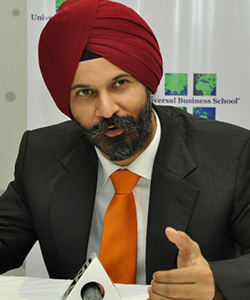Tarun Anand is a visionary leader in India’s management education diaspora. He runs the top-ranked Universal Business School, which he set up in 2009 as India’s first ‘Green Business School.’ He chose to develop award-winning BBA and MBA programs in India post his learnings from a highly distinguished corporate career. At 35, Tarun Anand was elevated to the youngest Chairman & Managing Director of Thomson Reuters, South Asia. He served as Director on the Board of ANI achieving the highest growth rate across BRIC nations.
The Nov 2020 GMAC (Graduate Management Admissions Council, a global, mission-driven association of leading graduate business schools) report states that the COVID induced economic downturn had made both schools and candidates eager to hedge risk and manage uncertainty.
The 2020 application season showed windfall gains for the credible MBA programs. As students navigated the unfamiliar and sought refuge in the tried and tested, the global demand for graduate management education has surged. Case in point is that nearly 3 in 4 full-time two-year MBA programs reported relative growth in applications.
The business schools at their end have recognized that.
- Value-driven and cost-conscious students are questioning what a traditional MBA provides.
- Professionals are seeking full-time programs which will allow them to navigate the new digital economy.
- Surveys on declining job satisfaction suggest that many professionals are tired of trading hours for dollars. Instead, they crave meaningful work and contribution.
The top B schools of the world started mulling over these concerns a long time ago. With placements being an important end game, leading management education practitioners and thinkers have been critically evaluating how ‘job ready’ and ‘ambiguity friendly’ they’re making their candidates in the first place.
The new determinant of this ability to hedge risk and manage uncertainty seems to be technology-friendliness. This is easy to understand-
- It is no longer possible to function in an organization without mastery of technology or an understanding of how technology brings about business transformation.
- It is no longer possible to function in an organization without adequate ownership of the outcomes. People are not happy to stay on the periphery.
Corporations coming to B schools for placements have begun to expect both the above from prospective candidates. Industry experts too are convinced that new-age technologies are impacting businesses across key sectors such as manufacturing, banking and finance, retail, media and entertainment, IT/ITES, telecommunications, healthcare and so on. And the latest industry figures confirm this upward trend. For example, the business analytics market is expected to surpass $200 billion. Companies are hiring Business Analytics professionals in Consulting, Finance, Telecommunications, Retail startups, the FAANG (Facebook, Amazon, Apple, Netflix and Google), conglomerates and old economy companies who urgently seek a digital transformation. The overall Data Analytics industry in India is currently estimated to be $3.03 Billion annually in size. The analytics industry is expected to double in size by 2025.
Technology as actionable intelligence
- Post-COVID, the world of business has re-examined survival, not just growth. Every business is being forced to look at how they can undergo digital transformation and reshape themselves to be relevant and competitive to survive! Digital transformation fundamentally changes how an organization operates and delivers value to customers. It’s also a cultural change that requires organizations to continually challenge the status quo, experiment, and get comfortable with failure.
- Big companies are completely reliant on Big Data as their business decisions involve vast sums of money and consequent competition. Therefore, businesses are transforming themselves into data-driven organizations to not just gather high-volume data but also high-quality data
- The kind of jobs that are now being created is quite new. The jobs that are left-brain oriented will be taken up by machines in the future. Newer jobs require that people either know how to use technology or how to build it.
- There is a widespread global consensus that the future of business belongs to design. Professionals have to apply design thinking and effectively innovate in the management practices of tomorrow, right from the business idea, the process to the end product through cross-disciplinary collaborative efforts.
- From better chatbots for customer service to data analytics to making predictive recommendations, deep learning and artificial intelligence in their many forms are seen by business leaders as an essential tool.
- A key factor in customer acceptance is user experience (UX) management – this is the practice of managing user experience by growing a strong UX culture with a focus on user-centred design and validation & UX design covers areas of UI design, usability testing and human factors etc.
The above requires that MBA be inclusive of skills such as UX/UI centred Product Design & Management, Business Process Innovation, Data Management & Integration, Data Visualization & Analysis, Machine Learning & Deep Learning, Artificial Intelligence in Business, Introduction to Applied Analytics etc; Familiarity with STEM subjects like Science, Technology, Engineering and Mathematics is essential for professionals to make sense of the above. Hence, the infusion of STEM into management education is imperative.
More About Tarun Anand

Tarun Anand also co-founded and served as Global Head of Strategy and Head of Asia-Pacific at FXMarketSpace (A Reuters & CME Group JV). His invention, “FXSettle” a revolutionary FX settlement solution, won several international innovation awards in 2008. In 2005, he was Global Head of Treasury, running a $2 billion dollar business across 136 countries and was invited by the Reuters Group CEO to join the Reuters Innovation and Venture Board. His high-profile career with Thomson Reuters spanned London, New York, Hong Kong & Mumbai.
Anand has an MBA from SPJIMR, Mumbai and pursued Executive Education at Michigan Business School-USA, Tuck School of Business-USA and IE Business School-Spain. His passion to create a college program that contributes skilled, job-ready candidates to satisfy the rigorous placement needs of India’s top corporates, led him to forge partnerships with leading global universities in UK, USA, France, Spain, Italy, Switzerland, Mexico and Bulgaria and bring global best practices in management education to India.
Anand was awarded the Education Evangelist of India by Great Place to Study in 2020 and selected as Global Goodwill Ambassador in 2018. Under his leadership, the Universal Business School has become one of the leading B-schools of India, offering students excellent placement opportunities after their MBA.
He loves mountaineering and has scaled Mt. Kilimanjaro and represented India in International Rugby tournaments.




